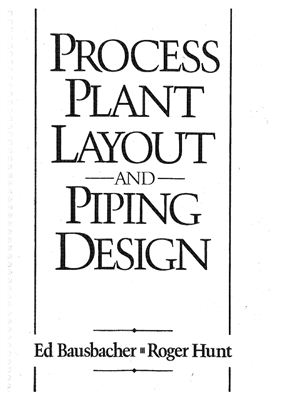Prentice Hall; 1 edition. 1993. 464p
Based on the authors' collective 65 years of experience in the engineering construction industry, this profusely illustrated, comprehensive guidebook presents tried-and-true workable methods and rules of thumb for plant layout and piping design for the process industries. Content is organized and presented for quick-reference on-the-job or for systematic study of specific topics. Presents general concepts and principles of plant layout - from basic terminology and input requirements to deliverables; deals with specific pieces of equipment and their most efficient layout in the overall plant design configuration; addresses the plant layout requirements for the most common process unit equipment; covers piping requirements for the entire plant as well as all equipment types; and considers the computerized tools that are now available to help plant layout and piping designers. Features more than 640 illustrations of equipment, piping and other components of processing facility - and their configurations. MARKETS: For mechanical and chemical engineers working for engineering construction as well as process manufacturing companies with responsibility for plant layout, piping, and construction; and for engineering students.
Based on the authors' collective 65 years of experience in the engineering construction industry, this profusely illustrated, comprehensive guidebook presents tried-and-true workable methods and rules of thumb for plant layout and piping design for the process industries. Content is organized and presented for quick-reference on-the-job or for systematic study of specific topics. Presents general concepts and principles of plant layout - from basic terminology and input requirements to deliverables; deals with specific pieces of equipment and their most efficient layout in the overall plant design configuration; addresses the plant layout requirements for the most common process unit equipment; covers piping requirements for the entire plant as well as all equipment types; and considers the computerized tools that are now available to help plant layout and piping designers. Features more than 640 illustrations of equipment, piping and other components of processing facility - and their configurations. MARKETS: For mechanical and chemical engineers working for engineering construction as well as process manufacturing companies with responsibility for plant layout, piping, and construction; and for engineering students.

